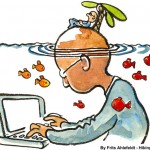
The e-Book is 40 Years Old

How is it going to handle its middle-age crisis?
The eBook was born in 1971, when Michael Hart founded the Project Gutenberg that makes electronic books available freely on the Internet.
Quietly growing in the underground, and largely ignored by the public at large for two and half decades, it received its first significant growth spurt around 2001 when rumors about the forthcoming purchase of NetLibrary, a Colorado-based firm to providing content, by OCLC (Online Computer Library Center, Inc.) began to spread.
In the meantime, E Ink Corp, a 1997 born company developing electrophoretic displays,a kind of electronic paper, was quietly improving on its product from its headquarters in Cambridge, Massachussets. (The technology they developed is now used, among others, by Kindle tablets.)
In 2002, the deal was done, NetLibrary was bought by OCLC – and sold 10 years later by the same to EBSCO (Elton B Stephens COmpany).
This was a serious wake up call for the publishing industry at large. Books and records are basically merely support for text and music respectively, the traditional cash cows of the publishing and record industries respectively.
The music industry is still reeling from the almost lethal blows inflicted by the emergence of MP3, YouTube and other electronic support for music. These supports bypass the traditional system established to protect the copyrights and royalties of musicians and the considerable earnings of the record companies.
Is the old fashion book going to become the next casualty of the evolution of the electronic world? Will people ever be willing to abandon the homey and reassuring feeling of the book object in their hands? The debate is still open, and so are numerous discussions about the best formulas to create in order to protect the traditional publishing houses.
Still, till 2008, the e-book market remained marginal. Sales of Kindle tablets and other support were slow to pick up and the publishing industry began to breathe. The paper book seemed to be safe.
 Then the eBook second growth spurt occurred. On the 25th of October 2008, Oprah declared on the air that the Kindle tablet was “her new favorite thing”. Next thing you know, Kindle tablets’ sales exploded, leaving Amazon panting and wheezing to keep up with the demand, and the publishing industry scrambling to find ways to keep their lead.
Then the eBook second growth spurt occurred. On the 25th of October 2008, Oprah declared on the air that the Kindle tablet was “her new favorite thing”. Next thing you know, Kindle tablets’ sales exploded, leaving Amazon panting and wheezing to keep up with the demand, and the publishing industry scrambling to find ways to keep their lead.
A surge in the number of books and book genres available in eBook format was one of the immediate consequences. As if the traditional publishing world did not have enough to worry about, the recession then hit the entire world.
Whether because of the recession of because of the rise of ebooks, the publishing world froze and became increasingly reluctant to publish risky writers, failing to fulfill their role as promoters of novelties and door openers in new literary realms.
Authors were increasingly required to take an active, even proactive part, in marketing their book, the traditional mission of the publishing house.
Faced with the uphill battle of finding an agent, waiting for the agent to secure a deal with a publishing house, low royalties and demands on their time to market themselves, authors increasingly began considering self-publishing as a valid option.
Whether a known author tempted by the option to cash in up to 70% royalties instead of the traditional 8-30% or a yet unpublished author tired of waiting for the Gods to notice his book, self-epublishing became more and more attractive.
Is this new option for writers soon to be crushed by one of its main engine of growth, Amazon? Well, rumors about Amazon intentions to become a publisher, are growing. This raises the question of promotion.
Once Amazon is a publisher, how do you think it will if affect its interest in promoting, or providing efficient promotion tools, to self-publishers?